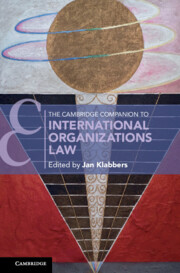Book contents
- The Cambridge Companion to International Organizations Law
- Cambridge Companions to Law
- The Cambridge Companion to International Organizations Law
- Copyright page
- Contents
- Contributors
- Acknowledgements
- Cases
- Introduction
- 1 Beyond Functionalism
- 2 The Concept of International Organization
- 3 Accountability
- 4 Inclusion and Exclusion in International Organizations
- 5 A Legal Framework on Internal Matters
- 6 Standard-Setting in UN System Organizations
- 7 Operational Activities
- 8 Deliberation
- 9 Teaching Statehood
- 10 Interaction between International Organizations
- 11 The International Organization for Migration and the Duty to Protect Migrants
- 12 Global Health
- 13 Energy Provision
- 14 International Organizations, Disarmament and State Behaviour
- 15 International Organizations and Stories of Development
- 16 Food Security and International Organizations
- 17 Financial Stability
- Epilogue
- Bibliography
- Index
6 - Standard-Setting in UN System Organizations
Published online by Cambridge University Press: 31 March 2022
- The Cambridge Companion to International Organizations Law
- Cambridge Companions to Law
- The Cambridge Companion to International Organizations Law
- Copyright page
- Contents
- Contributors
- Acknowledgements
- Cases
- Introduction
- 1 Beyond Functionalism
- 2 The Concept of International Organization
- 3 Accountability
- 4 Inclusion and Exclusion in International Organizations
- 5 A Legal Framework on Internal Matters
- 6 Standard-Setting in UN System Organizations
- 7 Operational Activities
- 8 Deliberation
- 9 Teaching Statehood
- 10 Interaction between International Organizations
- 11 The International Organization for Migration and the Duty to Protect Migrants
- 12 Global Health
- 13 Energy Provision
- 14 International Organizations, Disarmament and State Behaviour
- 15 International Organizations and Stories of Development
- 16 Food Security and International Organizations
- 17 Financial Stability
- Epilogue
- Bibliography
- Index
Summary
The absence of explicit lawmaking authority has not prevented international organizations from producing ‘standards’ that deviate from the ways the traditional sources of international law – treaties, custom, general principles – are usually understood. Despite the fact the UN was not given plenary authority to conclude treaties,1 a functionalist ‘principle of speciality’ imposes subject matter limits on UN system organizations,2 and entities charged with progressively developing or codifying the law (such as the International Law Commission (ILC)) can only make recommendations, the extent of standard-setting by international organizations vastly exceeds what might be expected from such limitations.3
- Type
- Chapter
- Information
- The Cambridge Companion to International Organizations Law , pp. 120 - 146Publisher: Cambridge University PressPrint publication year: 2022
- 1
- Cited by

